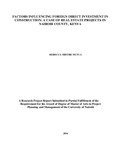| dc.description.abstract | Most countries strive to attract FDI because of its acknowledged advantages as a tool of
economic development. The study aims at determining the factors that influence FDI in
Construction, A case of Real Estate Projects in Nairobi County, Kenya. The objectives of
the study were establish the influence of trade regulations on FDI in Construction of Real
Estate Projects in Nairobi, determine the influence of economic growth rates on FDI in
Construction of Real Estate Projects in Nairobi, establish the influence of market size on
FDI in Construction of Real Estate Projects in Nairobi and ascertain the influence of
exchange rate valuation on FDI in Construction of Real Estate Projects in Nairobi. The
study was grounded on two theories; Dependency Theory and Internalization Theory of
Foreign Direct Investment. The study employed a descriptive research design. This study
focused on a population of 6 Real Estate Projects (by capital) in Nairobi as at 2015,
according to Kenya’s Real Estate Market. This study used census sampling method. The
sample size therefore comprised of all 6 investment managers, 6 project managers and 20
other senior staffs from different departments of the six Real Estate Projects (by capital)
in Kenya. This study used questionnaires as the primary tool for data collection. The
questionnaires contained both structured and unstructured questions. A pilot study was
conducted where one project was picked. Test re-test method was used to test for
reliability of the instrument. To establish the validity of the instruments in this research,
the instrument was presented to the research supervisor and defended in the faculty
forums where the research proposal was presented. Thereafter the questionnaire was
administered with approval of the supervisor. The data collected was analyzed using
descriptive statistics (measures of central tendency and measures of variations) to achieve
the objectives of the study. The quantitative data generated was analyzed using
descriptive statistics with the help of Statistical Package for Social Sciences (SPSS)
version 20. The findings were presented using tables, frequencies and percentages.
Throughout this study the researcher strived to adhere to ethical research considerations
and professional guidelines. The study found that all factors investigated (trade
regulations, economic growth rate, market size and exchange rate valuation) had
influence on FDI in Construction of Real Estate Projects in Nairobi. The study therefore
concluded that largely vertical FDI flows benefit from increasing openness, as might be
expected in a sector for which international trade flows in intermediate and capital goods
are important. In addition, the study concluded that Policies which promote economic
growth and development should be given sufficient attention in order to attract FDI. The
study further concludes that FDI moves to countries with larger and expanding markets
and greater purchasing power. The study also concludes that in order to profit in real
estate investments, investors must determine the value of the properties they buy and
make educated guesses about how much profit these investments will generate, whether
through property appreciation, rental income or a combination of both. The study also
recommends that the Central Bank of Kenya (CBK) and other regulators should plan in
advance and influence the macro-economic variables in the right direction. The
government should also aim to grow the country’s real GDP as this would enhance the
growth of FDI in Construction of real estate in the economy as established by the study.
The study recommended further research on the influence of FDI in construction of real
estate projects in other counties so as to generalize the findings. | en_US |



